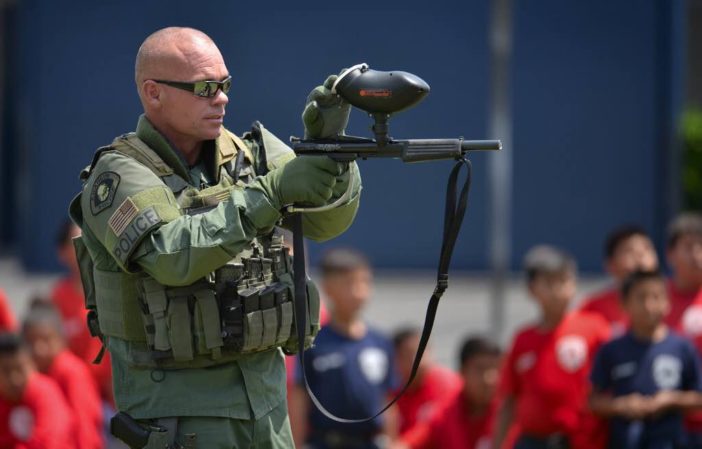Anaheim Police Officer Erik Degn has had a left shoulder and right elbow surgery and five knee surgeries over his 21 years in law enforcement.
And he just had an MRI on his right shoulder from an altercation while apprehending a suspect. He’s waiting to hear whether he’ll need surgery.
“It’s just part of the job,” he says. “You have to stay in shape (if) your job is physically demanding.”
Injuries are a way of life for members of law enforcement.
In fact, according to the Peace Officers Research Association of California website, various laws governing law enforcement presume several on-duty injuries, including hernia, heart problems, pneumonia, cancer, meningitis and lower-back impairment. And according to the FBI’s 2013 Law Enforcement Officers Killed & Assaulted statistics, of the 49,851 officers assaulted in 2013, 14,565 – or 29.2 percent – suffered injuries.
“As a police officer, you never expect to be [seriously]injured,” says Officer Sarah Shirvany, who has become the informal go-to person regarding on-duty injuries for the agency and in the law enforcement community in general. “Unfortunately with police officers, we do get injured on the job.”
Shirvany says the annual statistic for the number of officers who will get severely injured in the line of duty is more than 15,000. Beyond the injuries themselves, there’s a psychological and emotional toll that serious injuries have on officers having to quickly downshift from a highly active, physical life to a sedentary one while recovering from injury and/or surgery.
The emotional pain of injury
“I got depression very easily. I had to go to counseling,” Shirvany says of how she was affected by the life-changing back injury she suffered in 2013 following an altercation during a suspect apprehension.
She had three surgeries: one immediately following the injury, then a corrective surgery after a re-injury from wearing her gun belt, and finally a disc replacement surgery.
“I was just suffering excruciating pain,” she says.
Working through the pain
Sgt. Kelly Phillips, who also is a member of Peer Support, has suffered two major injuries while on duty. In December 2004, he was hit by a car and suffered two broken bones in his neck area and his right knee.
“It was a pretty traumatic injury, I’m lucky to be alive … I’m lucky to be walking,” he says. “Something like that can happen and you can be changed forever.”
The second injury occurred last year when he was impaled on a fence through his left hamstring/glute area during a foot pursuit.
“I’m one that’s lucky to have come back from a couple of serious injuries,” he says.
Phillips says severe injuries can easily lead down to a spiral of negative emotions.
“You’re home. You’re trying to recover. Your body’s not healthy. Your mind’s not getting the stimulation … plus the pain is overwhelming. You’re frustrated. Plus you’re on the meds,” he says. “I laid awake at night … because I didn’t have any stimulation.”
Because of the powerful opiates given as pain medication, it’s easy for officers to fall into a path of addiction. Phillips gave himself a time limit to get off the medication and worked through the pain with the help of physical therapy and exercise (he’s a triathlete) to keep that from happening.
He says it’s important for agencies to provide readily available support to injured officers throughout the recovery process – which is when they’ll need it most. There’s a fear and stigma agencies must overcome as well, he says, because many officers worry that if they seek counseling, they won’t be viewed as competent.
Degn says his doctor pointed out to him that members of law enforcement and firefighters are really pro athletes on every level – except they don’t retire in their mid-30s, they retire in their 50s and 60s.
“He said there’s no other sport that you have to do ’til your 50, 60 years old,” Degn says. “Guys just get naturally torn up… The harder you work, the more that you get tore up.”
Like Phillips, he’s gotten through his multiple injuries with the help of physical therapy and exercise, as well as the support of his wife (“She’s been really good taking care of me”).
“I think that if you don’t go into a surgery fit, the recovery time is longer. And if you don’t stay fit in your recovery time … it makes your recovery time even more,” Degn says. “Anytime I get stressed out, I try to work out.”
 Behind the Badge
Behind the Badge







